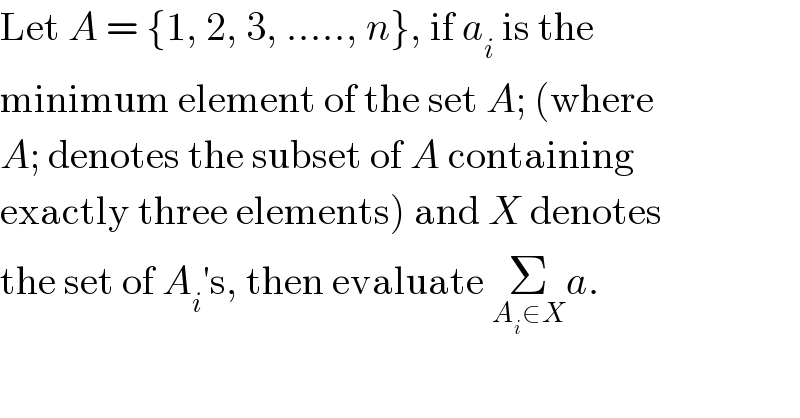
Question and Answers Forum
Previous in Permutation and Combination Next in Permutation and Combination
Question Number 22044 by Tinkutara last updated on 10/Oct/17

Answered by revenge last updated on 17/Oct/17
![Required sum=1∙^(n−1) C_2 +2∙^(n−2) C_2 +3∙^(n−3) C_2 +...+(n−2)∙^2 C_2 It is equal to the coefficient of x^2 in the expansion of (1+x)^(n−1) +2(1+x)^(n−2) +3(1+x)^(n−3) +...+(n−2)(1+x)^2 S=(1+x)^(n−1) +2(1+x)^(n−2) +3(1+x)^(n−3) +...+(n−2)(1+x)^2 (S/(1+x))= (1+x)^(n−2) +2(1+x)^(n−3) +...+(n−3)(1+x)^2 +(n−2)(1+x) S−(S/(1+x))=(1+x)^(n−1) +(1+x)^(n−2) +(1+x)^(n−3) +...+(1+x)^2 −(n−2)(1+x) ((Sx)/(1+x))=(((1+x)^2 [(1+x)^(n−2) −1])/x)−(n−2)(1+x) S=(((1+x)^3 [(1+x)^(n−2) −1])/x^2 )−(((n−2)(1+x)^2 )/x) S=(((1+x)^(n+1) )/x^2 )−(((1+x)^3 )/x^2 )−(n−2)((1+2x+x^2 )/x) x^2 term can be only obtained from (((1+x)^(n+1) )/x^2 ). So we require x^4 in (1+x)^(n+1) , which has the coefficient^(n+1) C_4 .](Q22417.png)
Commented by Tinkutara last updated on 17/Oct/17

